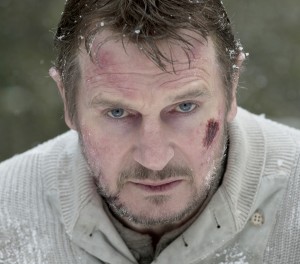The Grey critiques values of mankind
Liam Neeson is Hollywood’s resident badass. From Unknown, where he dominated a group of Russian spies, to Taken, where he destroyed an entire coalition of Serbian sex traffickers, it is generally accepted that he who crosses the path of Liam Neeson does not come out alive.

Bad ass · The role of Ottway, a suicidal widower forced to fend for himself in the Alaskan wilderness against an aggressive pack of wolves in writer and director Joe Carnahan’s latest film, was originally meant to be played by a younger actor, but Liam Neeson’s maturity, emotional depth, gritty reputation and popularity as a leading action star landed him the esteemed part. - Photo courtesy of EPK.TV
Unless, that is, Neeson’s adversaries are not human but rather wolves perhaps?
Cue Neeson’s newest film, The Grey. Directed by Joe Carnahan (The A-Team, Pride and Glory), The Grey tells the story of an unruly group of oil rig roughnecks who, after surviving a plane crash, find themselves stranded in a desolate expanse of the frigid Alaskan tundra. As if their plight weren’t trying enough, they quickly become the new targets of a ruthless pack of monstrously large and vicious wolves intent on picking off the men one by one until they are no longer encroaching upon the wolves’ territory.
Carnahan believes this film is undoubtedly his greatest work. He speaks about it as if it’s his own child, infused with a life, spirit and personality. Though he admits that the advertised hardcore action and idea of Neeson fighting wolves is likely what will draw many people to see the film, he assures that there is more to the story.
“The emotional content is much more important to me than the action,” Carnahan said. “It is a film about [nature and beauty] and how for all of its beauty, there are equal parts hostility, which is where the wolves and the cold and the water and the cliffs come into play.”
Shot in remote Smithers, Canada, the actors and crew had to deal with excruciatingly cold conditions, making their portrayals of the freezing temperatures in the film not that far from the truth.
“We got out of the plane, and it was 35 degrees below zero. I think it actually worked to our advantage,” said Frank Grillo, the actor playing the role of Diaz, one of the oil rig survivors in the film. “We didn’t have to make-believe we were cold. After the first week, we got used to it, and it was actually kind of fun.”
Even Neeson, a native of Ireland and no stranger to chilly weather, had some complaints about the horrendous conditions.
“It was so cold that the cameras were malfunctioning and equipment wasn’t working,” Neeson said. “Absolutely ludicrous.”
Despite the unsavory conditions, it didn’t take long for the actors to fall in love with the script, the characters and the entire experience.
“It was like being a little kid and playing cops and robbers,” said Grillo, whose surly, brash character marks a sharp distinction from the kind, friendly roles he usually plays. “I always play bubbly guys, but it was really fun to play the villain and just be really nasty and mean all the time.”
Neeson, starring as the tough yet internally troubled group leader Ottway, was a far cry from the initial “30-something-young-guy” actor Carnahan initially envisioned in the role.
But Neeson’s maturity ended up being paramount to the role, especially in the opening two minutes of the film when Ottway nearly commits suicide.
“I always envisioned a younger actor in the role of Ottway, but a lot of the young guys we tested just couldn’t really conceive of being willing to end their lives at 30,” Carnahan said. “But now I can’t even conceive of anyone other than Liam playing the role because he’s so brilliant and spot on.”
Neeson, who admits to “genuinely falling in love with the film” after his initial read, expressed a special attachment to the story.
“The script read like a 19th-century epic poem,” Neeson said. “It was just beautiful.”
Though he is no stranger to playing a super-masculine, dominant character, Neeson, whose towering stature sharply contradicts his calm demeanor, admits that this alpha-male prototype is completely unnatural for him.
“I’m so not a leader,” Neeson said. “I can play a leader though.”
Despite the action-oriented draw of the film, the actors and director all agree the film is not intended to merely entertain, but to tap into emotional life issues that are not often dealt with in the mundane, everyday world.
“The film speaks to the truth that men truly are as afraid as when they were children,” actor Grillo said. “It’s tough being a man. How do you define yourself? What is fear? What do you believe in? What are you willing to do to survive and live and protect your family? How far will I go before I quit?”
The film not only proposes questions regarding beliefs, morality and family, but also speaks to the value of life.
“The basic thesis of the film is that as important as it is how you live, it is equally important how you die,” Carnahan said. “My only hope for the film is that it plays beyond the two hours that it took to watch it.”

It’s always a treat reading your work and I’ve always enjoyed your writing Madame Baurdine. This article in particular however has one mistake. In the movie Taken, Neeson he deals with Albanian sex traffickers. I have no doubt that you meant no harm by it but it would be greatly appreciated if you corrected the error.
Thank you,
-Milan-